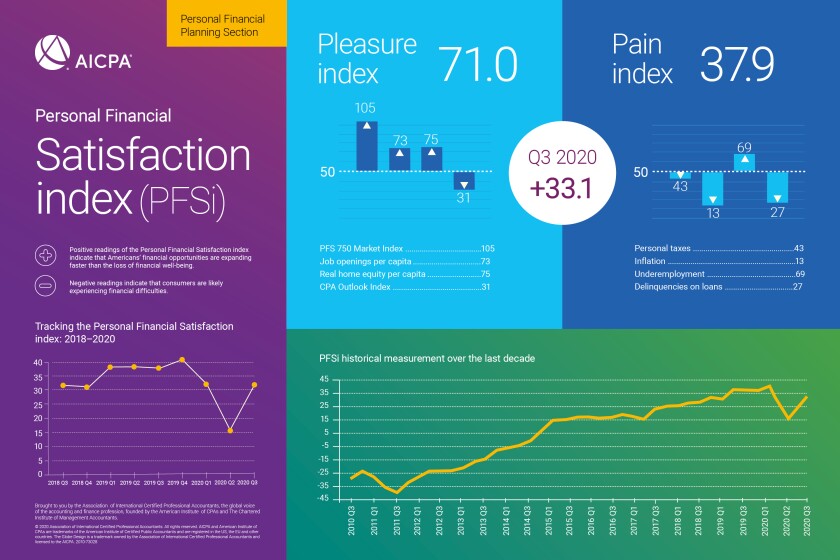Financial satisfaction of people in the U.S. rebounded strongly in the third quarter of the year, according to a new survey by the American Institute of CPAs, reversing the lows in the second quarter in the midst of the recession brought on by the novel coronavirus pandemic.
The AICPA’s Q3 2020 Personal Financial Satisfaction Index measured 33.1, representing a whopping 99 percent (16.5 point) increase from the previous quarter. That’s the biggest quarterly increase in the 27-year history of the PFSi, and a complete turnaround from the second quarter, when the index had its largest ever quarterly drop.
Chandan Lodha is the co-founder and president of CoinTracker, the leading portfolio tracking and tax compliance software for cryptocurrency. Since co-founding CoinTracker with Jon Lerner in 2017, the company has helped users file over a million tax forms. Before founding CoinTracker, he was a product manager at Alphabet, working on Project Loon (internet for rural parts of the world via stratospheric balloons), Google Now and Knowledge Graph. He received his BA degree with high honors in chemistry and physics from Harvard University.
Robert Cruz has been with Smarsh for over ten years as the Vice President of Regulatory and Information Governance. His primary objective is to help Smarsh customers stay informed of regulatory developments and deploy best practices in the use of digital communications technology. Robert is a recognized author, speaker, and subject matter expert in the area of digital communications compliance and brings over two decades of leadership in the governance, risk, and compliance market.
Chris Arnold is the Vice President of Contact Center Strategy at ASAPP, where he partners with leading insurance carriers to modernize claims, billing, and customer service operations with AI. With more than 15 years of experience in customer experience transformation and contact center innovation, he specializes in helping enterprises operationalize AI to drive measurable efficiency and improve policyholder satisfaction.
The PFSi is built around various factors, including the labor market. The gains can be mainly attributed to improvements in job openings per capita and underemployment. Those had the biggest impact on increasing the overall PFSi. The biggest factor driving the quarter-over-quarter rally was a 35 percent (37 point) decrease in underemployment. A decrease in underemployment improves overall financial satisfaction in the index. While there was an improvement in underemployment in the third quarter from Q2’s record high, it’s still 117 percent above its level a year ago. For the second consecutive quarter, underemployment is still the biggest negative contributor to the average American’s personal financial satisfaction. The Q3 underemployment level reflects data measured through the middle of September.
“As Americans continue to navigate the economic impact of the COVID-19 pandemic, it is important to remember that the fundamentals of financial planning haven’t changed,” said AICPA PFS Credential Committee chair Dave Stolz in a statement Thursday. “Though the stock market’s record performance is encouraging, 2020 has served as a reminder of the volatile nature of markets. As the impact of COVID-19 continues to play out across the country, investors should weigh their risk tolerance and ensure they have ample cash on hand. Further, a tax-efficient financial plan that includes a diversified portfolio can give confidence that long-term financial goals will remain within reach through this period of extreme uncertainty.”
The coronavirus put millions out of work, prompting job openings per capita to show a record plummet earlier this year. In the third quarter, job openings started to recover, climbing 37 percent (20 points) compared to Q2. That factor is now only 10 percent below its measurement a year ago before the pandemic. The Q3 index comes from July data from the U.S. Bureau of Labor Statistics.




